Exploring the Relationship Between Law and Moral Standards in Malaysia
VerifiedAdded on 2023/01/17
|13
|4089
|23
Essay
AI Summary
This essay examines the intricate relationship between law and moral standards, using Malaysia's Employment Act 1955 as a case study. It discusses how laws are often rooted in moral values, aiming to protect human interests and regulate conduct within society. The essay highlights that while morality is an internal concept, law is external, with disobedience leading to severe consequences. It further explores how business law shapes the minimum behavioral standards expected from organizations, going beyond mere legality. The analysis emphasizes that laws, such as the Employment Act 1955, incorporate ethical values and moral conduct, ensuring fair labor practices, reasonable working hours, and protection against discrimination. The essay concludes that compliance with these laws improves working conditions and fosters a favorable work environment, ultimately contributing to business success. Desklib offers this assignment solution and many other resources for students.
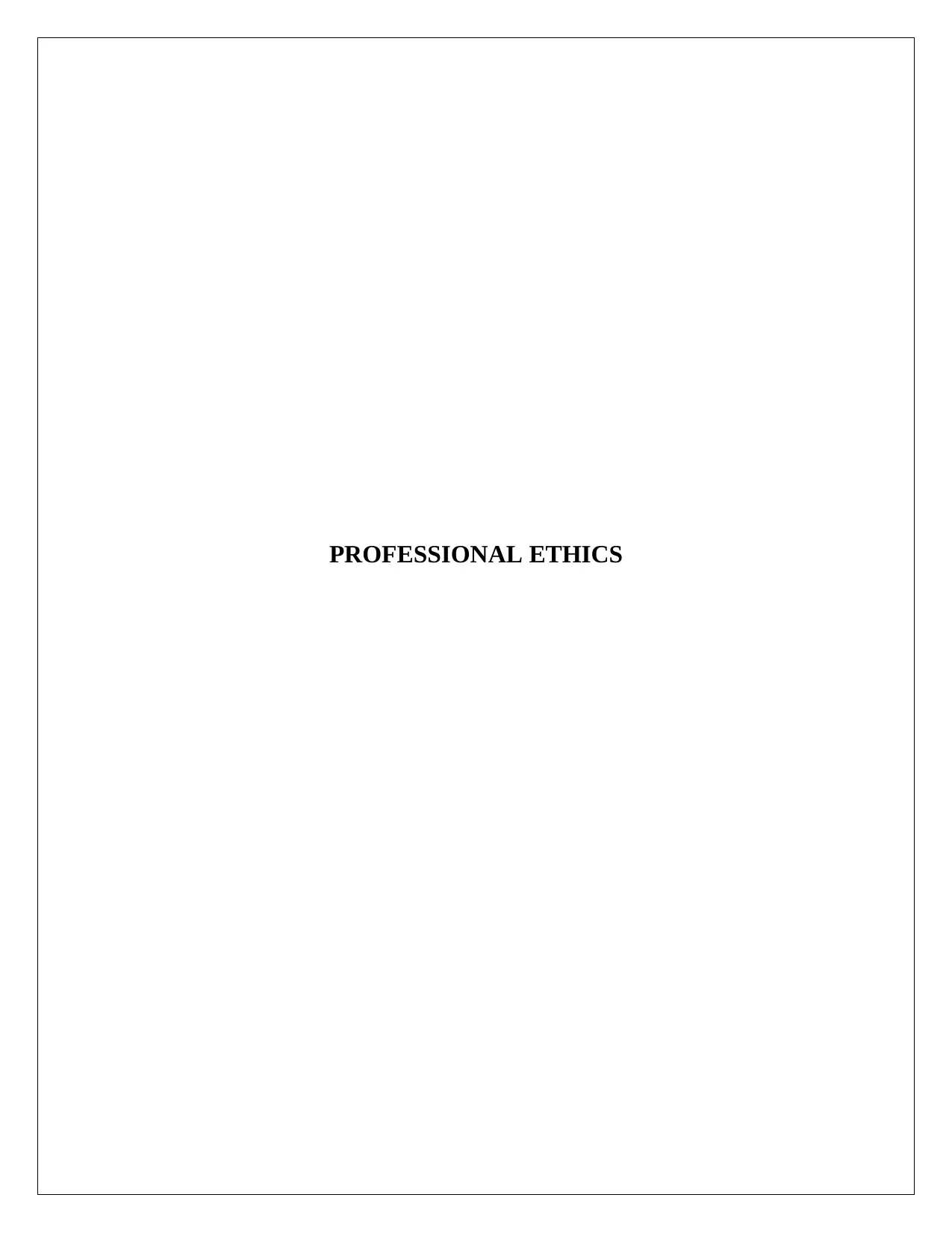
PROFESSIONAL ETHICS
Paraphrase This Document
Need a fresh take? Get an instant paraphrase of this document with our AI Paraphraser
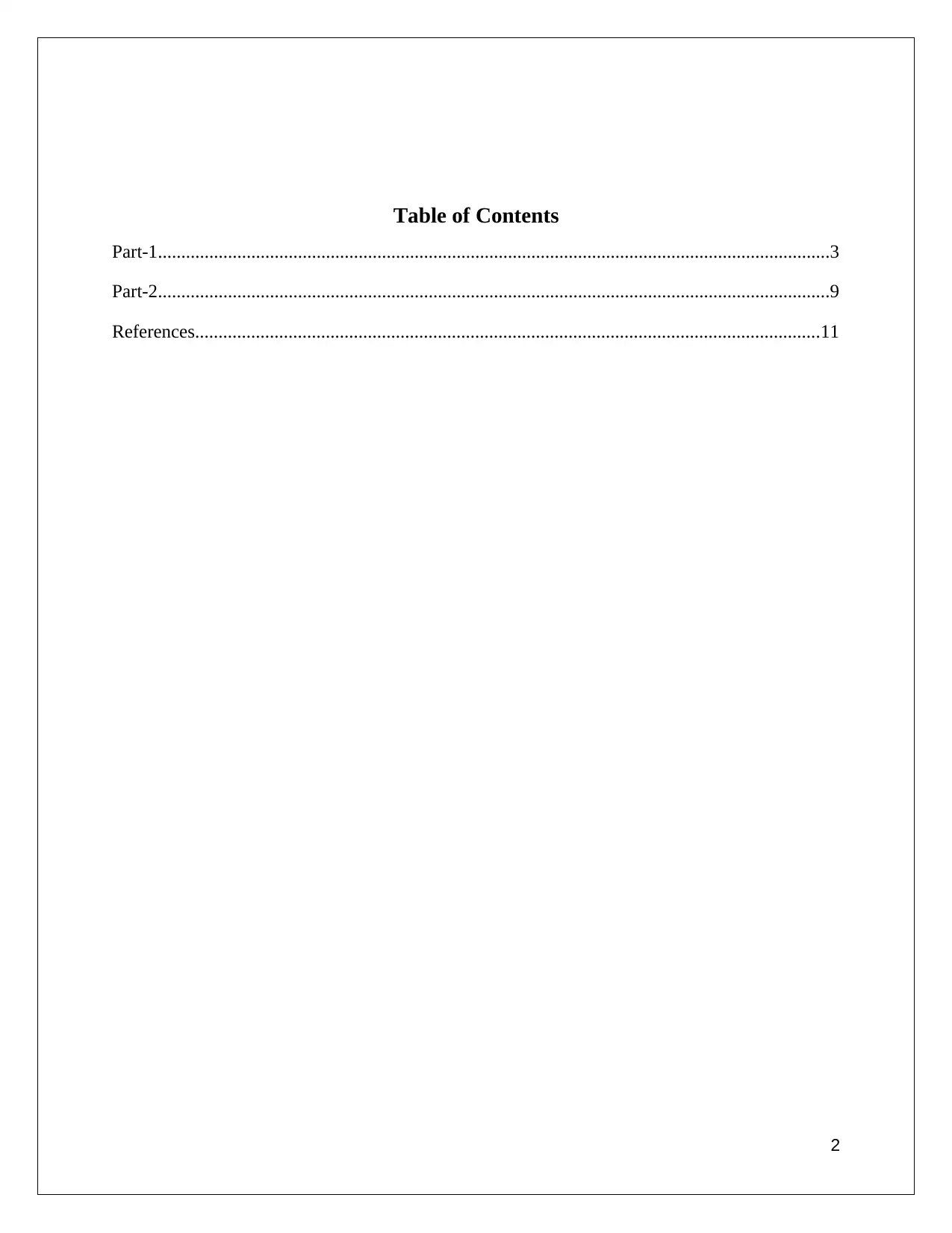
Table of Contents
Part-1................................................................................................................................................3
Part-2................................................................................................................................................9
References......................................................................................................................................11
2
Part-1................................................................................................................................................3
Part-2................................................................................................................................................9
References......................................................................................................................................11
2
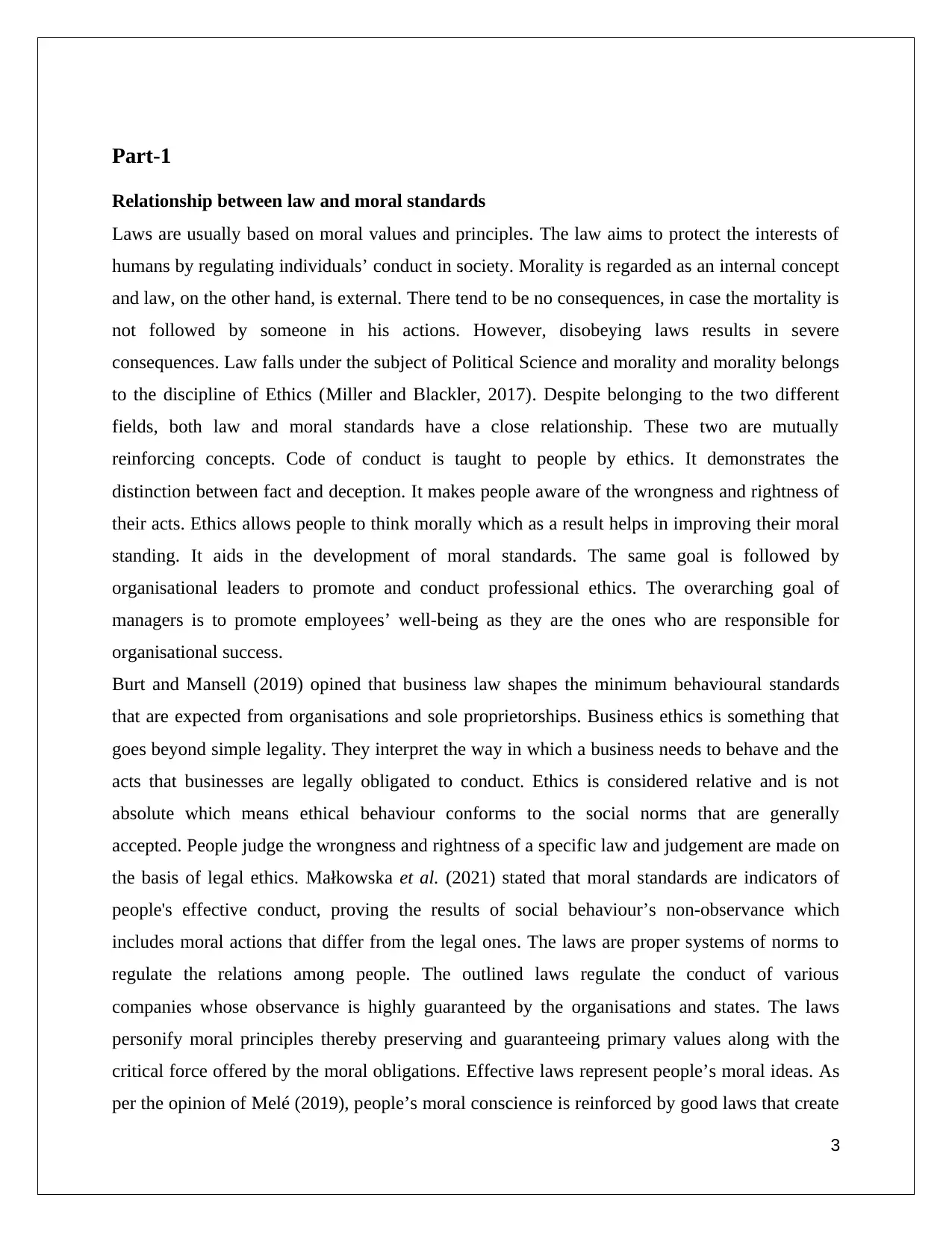
Part-1
Relationship between law and moral standards
Laws are usually based on moral values and principles. The law aims to protect the interests of
humans by regulating individuals’ conduct in society. Morality is regarded as an internal concept
and law, on the other hand, is external. There tend to be no consequences, in case the mortality is
not followed by someone in his actions. However, disobeying laws results in severe
consequences. Law falls under the subject of Political Science and morality and morality belongs
to the discipline of Ethics (Miller and Blackler, 2017). Despite belonging to the two different
fields, both law and moral standards have a close relationship. These two are mutually
reinforcing concepts. Code of conduct is taught to people by ethics. It demonstrates the
distinction between fact and deception. It makes people aware of the wrongness and rightness of
their acts. Ethics allows people to think morally which as a result helps in improving their moral
standing. It aids in the development of moral standards. The same goal is followed by
organisational leaders to promote and conduct professional ethics. The overarching goal of
managers is to promote employees’ well-being as they are the ones who are responsible for
organisational success.
Burt and Mansell (2019) opined that business law shapes the minimum behavioural standards
that are expected from organisations and sole proprietorships. Business ethics is something that
goes beyond simple legality. They interpret the way in which a business needs to behave and the
acts that businesses are legally obligated to conduct. Ethics is considered relative and is not
absolute which means ethical behaviour conforms to the social norms that are generally
accepted. People judge the wrongness and rightness of a specific law and judgement are made on
the basis of legal ethics. Małkowska et al. (2021) stated that moral standards are indicators of
people's effective conduct, proving the results of social behaviour’s non-observance which
includes moral actions that differ from the legal ones. The laws are proper systems of norms to
regulate the relations among people. The outlined laws regulate the conduct of various
companies whose observance is highly guaranteed by the organisations and states. The laws
personify moral principles thereby preserving and guaranteeing primary values along with the
critical force offered by the moral obligations. Effective laws represent people’s moral ideas. As
per the opinion of Melé (2019), people’s moral conscience is reinforced by good laws that create
3
Relationship between law and moral standards
Laws are usually based on moral values and principles. The law aims to protect the interests of
humans by regulating individuals’ conduct in society. Morality is regarded as an internal concept
and law, on the other hand, is external. There tend to be no consequences, in case the mortality is
not followed by someone in his actions. However, disobeying laws results in severe
consequences. Law falls under the subject of Political Science and morality and morality belongs
to the discipline of Ethics (Miller and Blackler, 2017). Despite belonging to the two different
fields, both law and moral standards have a close relationship. These two are mutually
reinforcing concepts. Code of conduct is taught to people by ethics. It demonstrates the
distinction between fact and deception. It makes people aware of the wrongness and rightness of
their acts. Ethics allows people to think morally which as a result helps in improving their moral
standing. It aids in the development of moral standards. The same goal is followed by
organisational leaders to promote and conduct professional ethics. The overarching goal of
managers is to promote employees’ well-being as they are the ones who are responsible for
organisational success.
Burt and Mansell (2019) opined that business law shapes the minimum behavioural standards
that are expected from organisations and sole proprietorships. Business ethics is something that
goes beyond simple legality. They interpret the way in which a business needs to behave and the
acts that businesses are legally obligated to conduct. Ethics is considered relative and is not
absolute which means ethical behaviour conforms to the social norms that are generally
accepted. People judge the wrongness and rightness of a specific law and judgement are made on
the basis of legal ethics. Małkowska et al. (2021) stated that moral standards are indicators of
people's effective conduct, proving the results of social behaviour’s non-observance which
includes moral actions that differ from the legal ones. The laws are proper systems of norms to
regulate the relations among people. The outlined laws regulate the conduct of various
companies whose observance is highly guaranteed by the organisations and states. The laws
personify moral principles thereby preserving and guaranteeing primary values along with the
critical force offered by the moral obligations. Effective laws represent people’s moral ideas. As
per the opinion of Melé (2019), people’s moral conscience is reinforced by good laws that create
3
⊘ This is a preview!⊘
Do you want full access?
Subscribe today to unlock all pages.

Trusted by 1+ million students worldwide
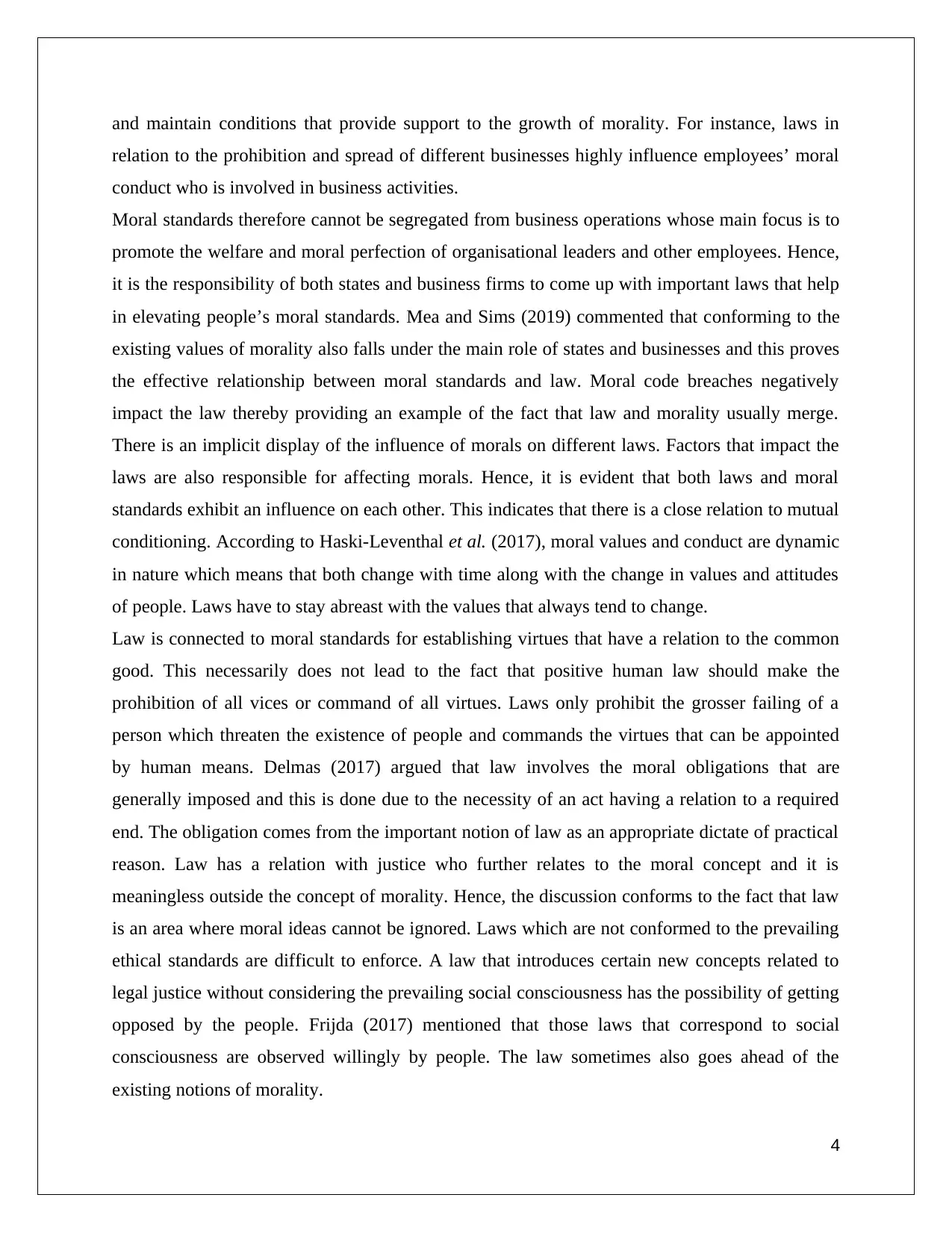
and maintain conditions that provide support to the growth of morality. For instance, laws in
relation to the prohibition and spread of different businesses highly influence employees’ moral
conduct who is involved in business activities.
Moral standards therefore cannot be segregated from business operations whose main focus is to
promote the welfare and moral perfection of organisational leaders and other employees. Hence,
it is the responsibility of both states and business firms to come up with important laws that help
in elevating people’s moral standards. Mea and Sims (2019) commented that conforming to the
existing values of morality also falls under the main role of states and businesses and this proves
the effective relationship between moral standards and law. Moral code breaches negatively
impact the law thereby providing an example of the fact that law and morality usually merge.
There is an implicit display of the influence of morals on different laws. Factors that impact the
laws are also responsible for affecting morals. Hence, it is evident that both laws and moral
standards exhibit an influence on each other. This indicates that there is a close relation to mutual
conditioning. According to Haski-Leventhal et al. (2017), moral values and conduct are dynamic
in nature which means that both change with time along with the change in values and attitudes
of people. Laws have to stay abreast with the values that always tend to change.
Law is connected to moral standards for establishing virtues that have a relation to the common
good. This necessarily does not lead to the fact that positive human law should make the
prohibition of all vices or command of all virtues. Laws only prohibit the grosser failing of a
person which threaten the existence of people and commands the virtues that can be appointed
by human means. Delmas (2017) argued that law involves the moral obligations that are
generally imposed and this is done due to the necessity of an act having a relation to a required
end. The obligation comes from the important notion of law as an appropriate dictate of practical
reason. Law has a relation with justice who further relates to the moral concept and it is
meaningless outside the concept of morality. Hence, the discussion conforms to the fact that law
is an area where moral ideas cannot be ignored. Laws which are not conformed to the prevailing
ethical standards are difficult to enforce. A law that introduces certain new concepts related to
legal justice without considering the prevailing social consciousness has the possibility of getting
opposed by the people. Frijda (2017) mentioned that those laws that correspond to social
consciousness are observed willingly by people. The law sometimes also goes ahead of the
existing notions of morality.
4
relation to the prohibition and spread of different businesses highly influence employees’ moral
conduct who is involved in business activities.
Moral standards therefore cannot be segregated from business operations whose main focus is to
promote the welfare and moral perfection of organisational leaders and other employees. Hence,
it is the responsibility of both states and business firms to come up with important laws that help
in elevating people’s moral standards. Mea and Sims (2019) commented that conforming to the
existing values of morality also falls under the main role of states and businesses and this proves
the effective relationship between moral standards and law. Moral code breaches negatively
impact the law thereby providing an example of the fact that law and morality usually merge.
There is an implicit display of the influence of morals on different laws. Factors that impact the
laws are also responsible for affecting morals. Hence, it is evident that both laws and moral
standards exhibit an influence on each other. This indicates that there is a close relation to mutual
conditioning. According to Haski-Leventhal et al. (2017), moral values and conduct are dynamic
in nature which means that both change with time along with the change in values and attitudes
of people. Laws have to stay abreast with the values that always tend to change.
Law is connected to moral standards for establishing virtues that have a relation to the common
good. This necessarily does not lead to the fact that positive human law should make the
prohibition of all vices or command of all virtues. Laws only prohibit the grosser failing of a
person which threaten the existence of people and commands the virtues that can be appointed
by human means. Delmas (2017) argued that law involves the moral obligations that are
generally imposed and this is done due to the necessity of an act having a relation to a required
end. The obligation comes from the important notion of law as an appropriate dictate of practical
reason. Law has a relation with justice who further relates to the moral concept and it is
meaningless outside the concept of morality. Hence, the discussion conforms to the fact that law
is an area where moral ideas cannot be ignored. Laws which are not conformed to the prevailing
ethical standards are difficult to enforce. A law that introduces certain new concepts related to
legal justice without considering the prevailing social consciousness has the possibility of getting
opposed by the people. Frijda (2017) mentioned that those laws that correspond to social
consciousness are observed willingly by people. The law sometimes also goes ahead of the
existing notions of morality.
4
Paraphrase This Document
Need a fresh take? Get an instant paraphrase of this document with our AI Paraphraser
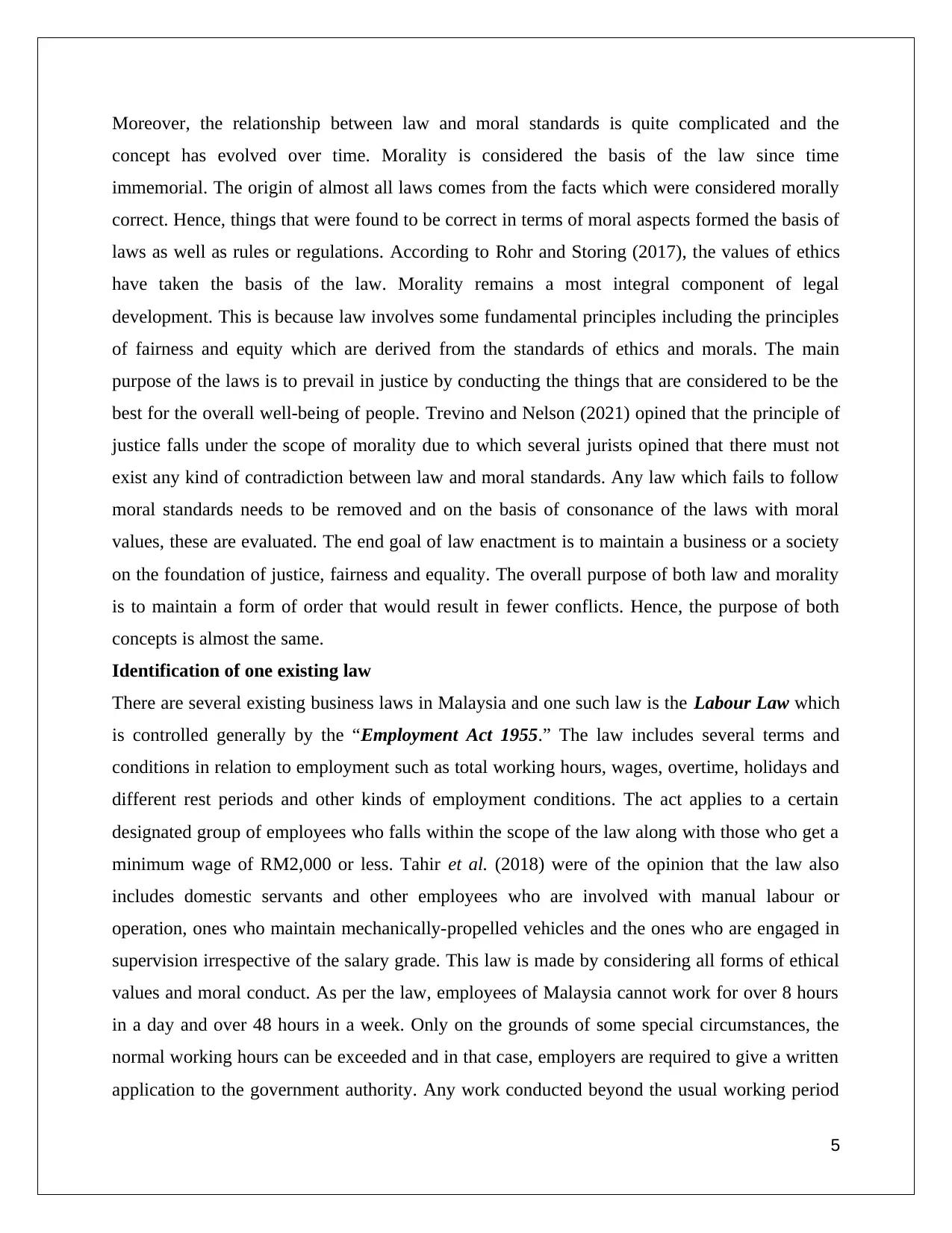
Moreover, the relationship between law and moral standards is quite complicated and the
concept has evolved over time. Morality is considered the basis of the law since time
immemorial. The origin of almost all laws comes from the facts which were considered morally
correct. Hence, things that were found to be correct in terms of moral aspects formed the basis of
laws as well as rules or regulations. According to Rohr and Storing (2017), the values of ethics
have taken the basis of the law. Morality remains a most integral component of legal
development. This is because law involves some fundamental principles including the principles
of fairness and equity which are derived from the standards of ethics and morals. The main
purpose of the laws is to prevail in justice by conducting the things that are considered to be the
best for the overall well-being of people. Trevino and Nelson (2021) opined that the principle of
justice falls under the scope of morality due to which several jurists opined that there must not
exist any kind of contradiction between law and moral standards. Any law which fails to follow
moral standards needs to be removed and on the basis of consonance of the laws with moral
values, these are evaluated. The end goal of law enactment is to maintain a business or a society
on the foundation of justice, fairness and equality. The overall purpose of both law and morality
is to maintain a form of order that would result in fewer conflicts. Hence, the purpose of both
concepts is almost the same.
Identification of one existing law
There are several existing business laws in Malaysia and one such law is the Labour Law which
is controlled generally by the “Employment Act 1955.” The law includes several terms and
conditions in relation to employment such as total working hours, wages, overtime, holidays and
different rest periods and other kinds of employment conditions. The act applies to a certain
designated group of employees who falls within the scope of the law along with those who get a
minimum wage of RM2,000 or less. Tahir et al. (2018) were of the opinion that the law also
includes domestic servants and other employees who are involved with manual labour or
operation, ones who maintain mechanically-propelled vehicles and the ones who are engaged in
supervision irrespective of the salary grade. This law is made by considering all forms of ethical
values and moral conduct. As per the law, employees of Malaysia cannot work for over 8 hours
in a day and over 48 hours in a week. Only on the grounds of some special circumstances, the
normal working hours can be exceeded and in that case, employers are required to give a written
application to the government authority. Any work conducted beyond the usual working period
5
concept has evolved over time. Morality is considered the basis of the law since time
immemorial. The origin of almost all laws comes from the facts which were considered morally
correct. Hence, things that were found to be correct in terms of moral aspects formed the basis of
laws as well as rules or regulations. According to Rohr and Storing (2017), the values of ethics
have taken the basis of the law. Morality remains a most integral component of legal
development. This is because law involves some fundamental principles including the principles
of fairness and equity which are derived from the standards of ethics and morals. The main
purpose of the laws is to prevail in justice by conducting the things that are considered to be the
best for the overall well-being of people. Trevino and Nelson (2021) opined that the principle of
justice falls under the scope of morality due to which several jurists opined that there must not
exist any kind of contradiction between law and moral standards. Any law which fails to follow
moral standards needs to be removed and on the basis of consonance of the laws with moral
values, these are evaluated. The end goal of law enactment is to maintain a business or a society
on the foundation of justice, fairness and equality. The overall purpose of both law and morality
is to maintain a form of order that would result in fewer conflicts. Hence, the purpose of both
concepts is almost the same.
Identification of one existing law
There are several existing business laws in Malaysia and one such law is the Labour Law which
is controlled generally by the “Employment Act 1955.” The law includes several terms and
conditions in relation to employment such as total working hours, wages, overtime, holidays and
different rest periods and other kinds of employment conditions. The act applies to a certain
designated group of employees who falls within the scope of the law along with those who get a
minimum wage of RM2,000 or less. Tahir et al. (2018) were of the opinion that the law also
includes domestic servants and other employees who are involved with manual labour or
operation, ones who maintain mechanically-propelled vehicles and the ones who are engaged in
supervision irrespective of the salary grade. This law is made by considering all forms of ethical
values and moral conduct. As per the law, employees of Malaysia cannot work for over 8 hours
in a day and over 48 hours in a week. Only on the grounds of some special circumstances, the
normal working hours can be exceeded and in that case, employers are required to give a written
application to the government authority. Any work conducted beyond the usual working period
5
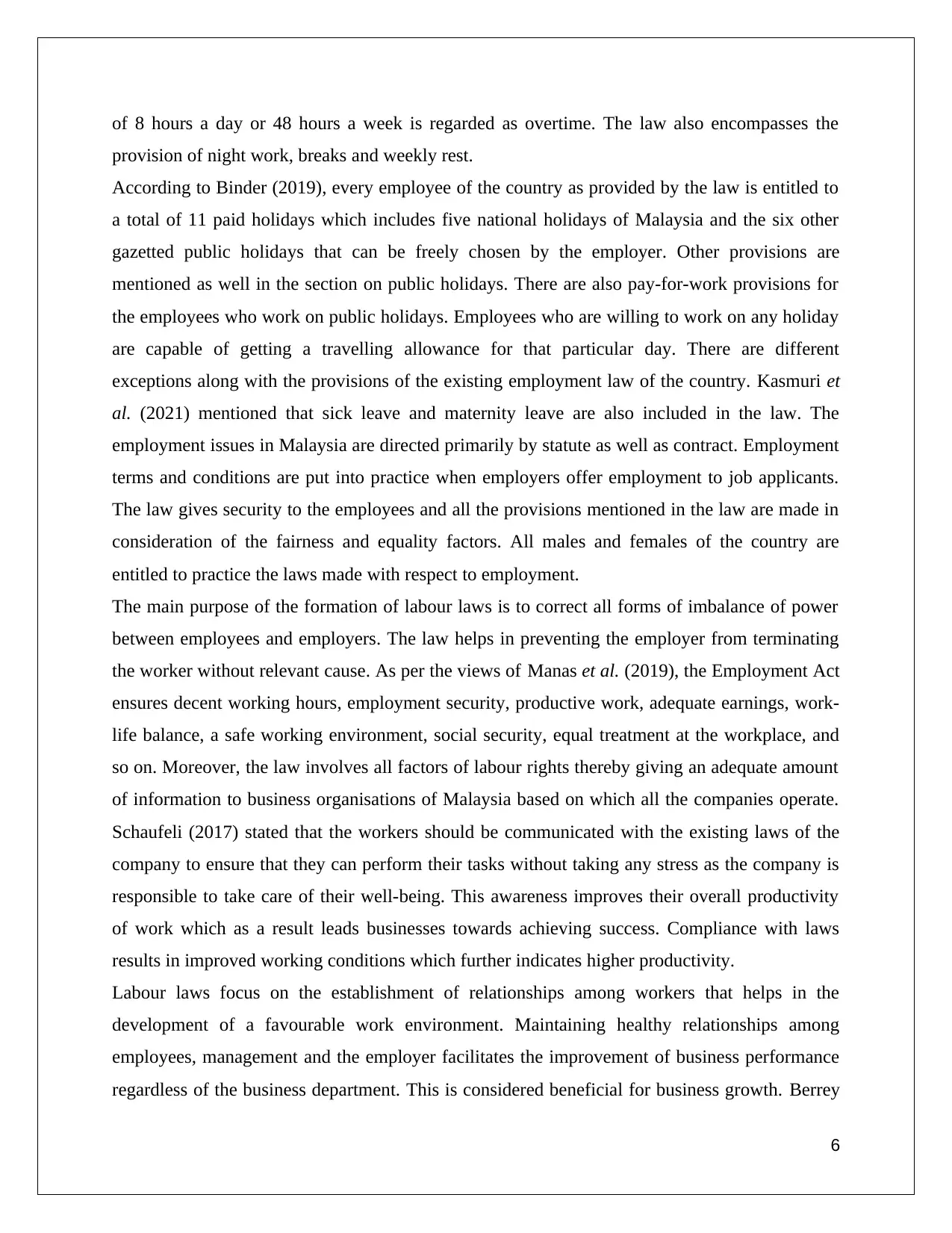
of 8 hours a day or 48 hours a week is regarded as overtime. The law also encompasses the
provision of night work, breaks and weekly rest.
According to Binder (2019), every employee of the country as provided by the law is entitled to
a total of 11 paid holidays which includes five national holidays of Malaysia and the six other
gazetted public holidays that can be freely chosen by the employer. Other provisions are
mentioned as well in the section on public holidays. There are also pay-for-work provisions for
the employees who work on public holidays. Employees who are willing to work on any holiday
are capable of getting a travelling allowance for that particular day. There are different
exceptions along with the provisions of the existing employment law of the country. Kasmuri et
al. (2021) mentioned that sick leave and maternity leave are also included in the law. The
employment issues in Malaysia are directed primarily by statute as well as contract. Employment
terms and conditions are put into practice when employers offer employment to job applicants.
The law gives security to the employees and all the provisions mentioned in the law are made in
consideration of the fairness and equality factors. All males and females of the country are
entitled to practice the laws made with respect to employment.
The main purpose of the formation of labour laws is to correct all forms of imbalance of power
between employees and employers. The law helps in preventing the employer from terminating
the worker without relevant cause. As per the views of Manas et al. (2019), the Employment Act
ensures decent working hours, employment security, productive work, adequate earnings, work-
life balance, a safe working environment, social security, equal treatment at the workplace, and
so on. Moreover, the law involves all factors of labour rights thereby giving an adequate amount
of information to business organisations of Malaysia based on which all the companies operate.
Schaufeli (2017) stated that the workers should be communicated with the existing laws of the
company to ensure that they can perform their tasks without taking any stress as the company is
responsible to take care of their well-being. This awareness improves their overall productivity
of work which as a result leads businesses towards achieving success. Compliance with laws
results in improved working conditions which further indicates higher productivity.
Labour laws focus on the establishment of relationships among workers that helps in the
development of a favourable work environment. Maintaining healthy relationships among
employees, management and the employer facilitates the improvement of business performance
regardless of the business department. This is considered beneficial for business growth. Berrey
6
provision of night work, breaks and weekly rest.
According to Binder (2019), every employee of the country as provided by the law is entitled to
a total of 11 paid holidays which includes five national holidays of Malaysia and the six other
gazetted public holidays that can be freely chosen by the employer. Other provisions are
mentioned as well in the section on public holidays. There are also pay-for-work provisions for
the employees who work on public holidays. Employees who are willing to work on any holiday
are capable of getting a travelling allowance for that particular day. There are different
exceptions along with the provisions of the existing employment law of the country. Kasmuri et
al. (2021) mentioned that sick leave and maternity leave are also included in the law. The
employment issues in Malaysia are directed primarily by statute as well as contract. Employment
terms and conditions are put into practice when employers offer employment to job applicants.
The law gives security to the employees and all the provisions mentioned in the law are made in
consideration of the fairness and equality factors. All males and females of the country are
entitled to practice the laws made with respect to employment.
The main purpose of the formation of labour laws is to correct all forms of imbalance of power
between employees and employers. The law helps in preventing the employer from terminating
the worker without relevant cause. As per the views of Manas et al. (2019), the Employment Act
ensures decent working hours, employment security, productive work, adequate earnings, work-
life balance, a safe working environment, social security, equal treatment at the workplace, and
so on. Moreover, the law involves all factors of labour rights thereby giving an adequate amount
of information to business organisations of Malaysia based on which all the companies operate.
Schaufeli (2017) stated that the workers should be communicated with the existing laws of the
company to ensure that they can perform their tasks without taking any stress as the company is
responsible to take care of their well-being. This awareness improves their overall productivity
of work which as a result leads businesses towards achieving success. Compliance with laws
results in improved working conditions which further indicates higher productivity.
Labour laws focus on the establishment of relationships among workers that helps in the
development of a favourable work environment. Maintaining healthy relationships among
employees, management and the employer facilitates the improvement of business performance
regardless of the business department. This is considered beneficial for business growth. Berrey
6
⊘ This is a preview!⊘
Do you want full access?
Subscribe today to unlock all pages.

Trusted by 1+ million students worldwide
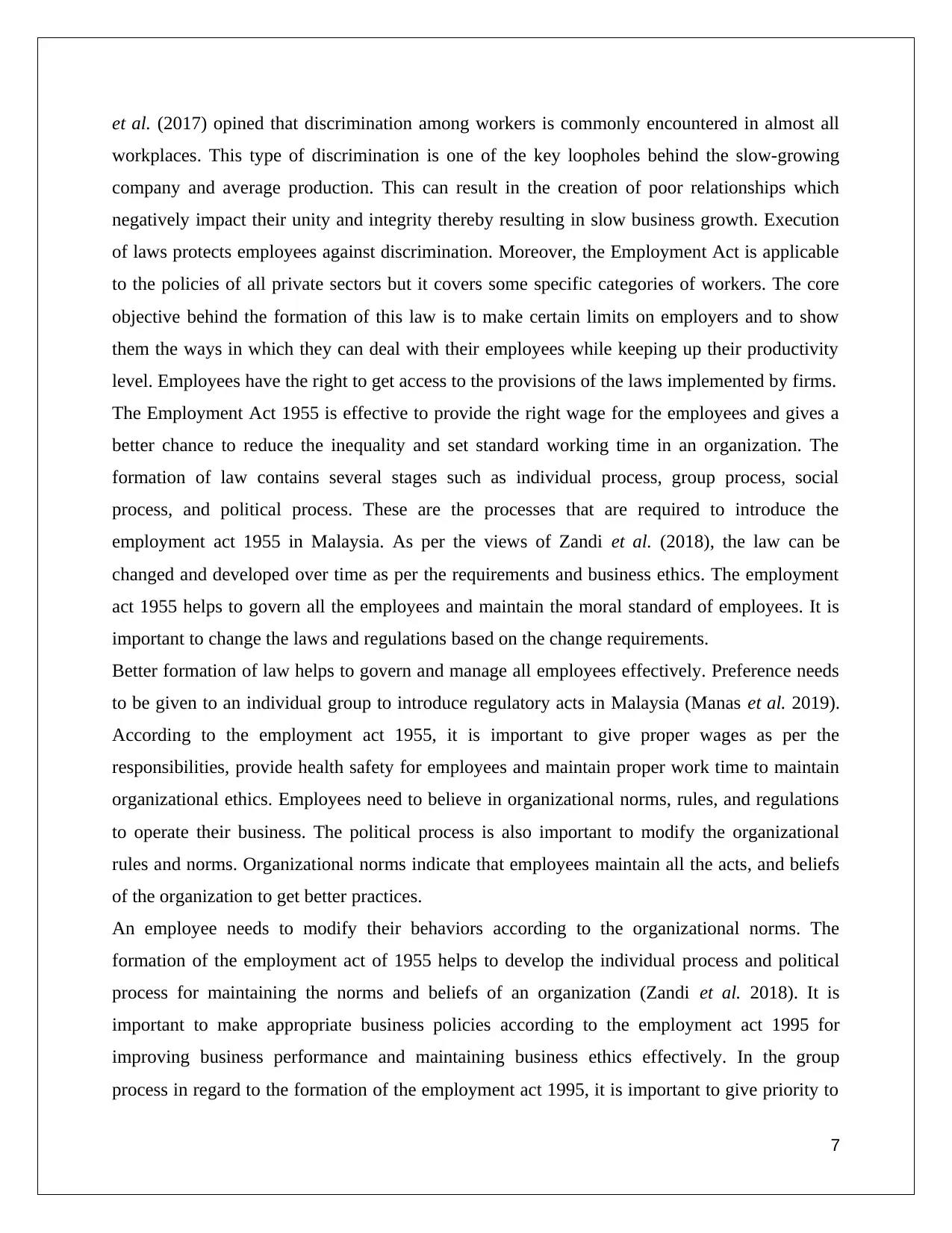
et al. (2017) opined that discrimination among workers is commonly encountered in almost all
workplaces. This type of discrimination is one of the key loopholes behind the slow-growing
company and average production. This can result in the creation of poor relationships which
negatively impact their unity and integrity thereby resulting in slow business growth. Execution
of laws protects employees against discrimination. Moreover, the Employment Act is applicable
to the policies of all private sectors but it covers some specific categories of workers. The core
objective behind the formation of this law is to make certain limits on employers and to show
them the ways in which they can deal with their employees while keeping up their productivity
level. Employees have the right to get access to the provisions of the laws implemented by firms.
The Employment Act 1955 is effective to provide the right wage for the employees and gives a
better chance to reduce the inequality and set standard working time in an organization. The
formation of law contains several stages such as individual process, group process, social
process, and political process. These are the processes that are required to introduce the
employment act 1955 in Malaysia. As per the views of Zandi et al. (2018), the law can be
changed and developed over time as per the requirements and business ethics. The employment
act 1955 helps to govern all the employees and maintain the moral standard of employees. It is
important to change the laws and regulations based on the change requirements.
Better formation of law helps to govern and manage all employees effectively. Preference needs
to be given to an individual group to introduce regulatory acts in Malaysia (Manas et al. 2019).
According to the employment act 1955, it is important to give proper wages as per the
responsibilities, provide health safety for employees and maintain proper work time to maintain
organizational ethics. Employees need to believe in organizational norms, rules, and regulations
to operate their business. The political process is also important to modify the organizational
rules and norms. Organizational norms indicate that employees maintain all the acts, and beliefs
of the organization to get better practices.
An employee needs to modify their behaviors according to the organizational norms. The
formation of the employment act of 1955 helps to develop the individual process and political
process for maintaining the norms and beliefs of an organization (Zandi et al. 2018). It is
important to make appropriate business policies according to the employment act 1995 for
improving business performance and maintaining business ethics effectively. In the group
process in regard to the formation of the employment act 1995, it is important to give priority to
7
workplaces. This type of discrimination is one of the key loopholes behind the slow-growing
company and average production. This can result in the creation of poor relationships which
negatively impact their unity and integrity thereby resulting in slow business growth. Execution
of laws protects employees against discrimination. Moreover, the Employment Act is applicable
to the policies of all private sectors but it covers some specific categories of workers. The core
objective behind the formation of this law is to make certain limits on employers and to show
them the ways in which they can deal with their employees while keeping up their productivity
level. Employees have the right to get access to the provisions of the laws implemented by firms.
The Employment Act 1955 is effective to provide the right wage for the employees and gives a
better chance to reduce the inequality and set standard working time in an organization. The
formation of law contains several stages such as individual process, group process, social
process, and political process. These are the processes that are required to introduce the
employment act 1955 in Malaysia. As per the views of Zandi et al. (2018), the law can be
changed and developed over time as per the requirements and business ethics. The employment
act 1955 helps to govern all the employees and maintain the moral standard of employees. It is
important to change the laws and regulations based on the change requirements.
Better formation of law helps to govern and manage all employees effectively. Preference needs
to be given to an individual group to introduce regulatory acts in Malaysia (Manas et al. 2019).
According to the employment act 1955, it is important to give proper wages as per the
responsibilities, provide health safety for employees and maintain proper work time to maintain
organizational ethics. Employees need to believe in organizational norms, rules, and regulations
to operate their business. The political process is also important to modify the organizational
rules and norms. Organizational norms indicate that employees maintain all the acts, and beliefs
of the organization to get better practices.
An employee needs to modify their behaviors according to the organizational norms. The
formation of the employment act of 1955 helps to develop the individual process and political
process for maintaining the norms and beliefs of an organization (Zandi et al. 2018). It is
important to make appropriate business policies according to the employment act 1995 for
improving business performance and maintaining business ethics effectively. In the group
process in regard to the formation of the employment act 1995, it is important to give priority to
7
Paraphrase This Document
Need a fresh take? Get an instant paraphrase of this document with our AI Paraphraser
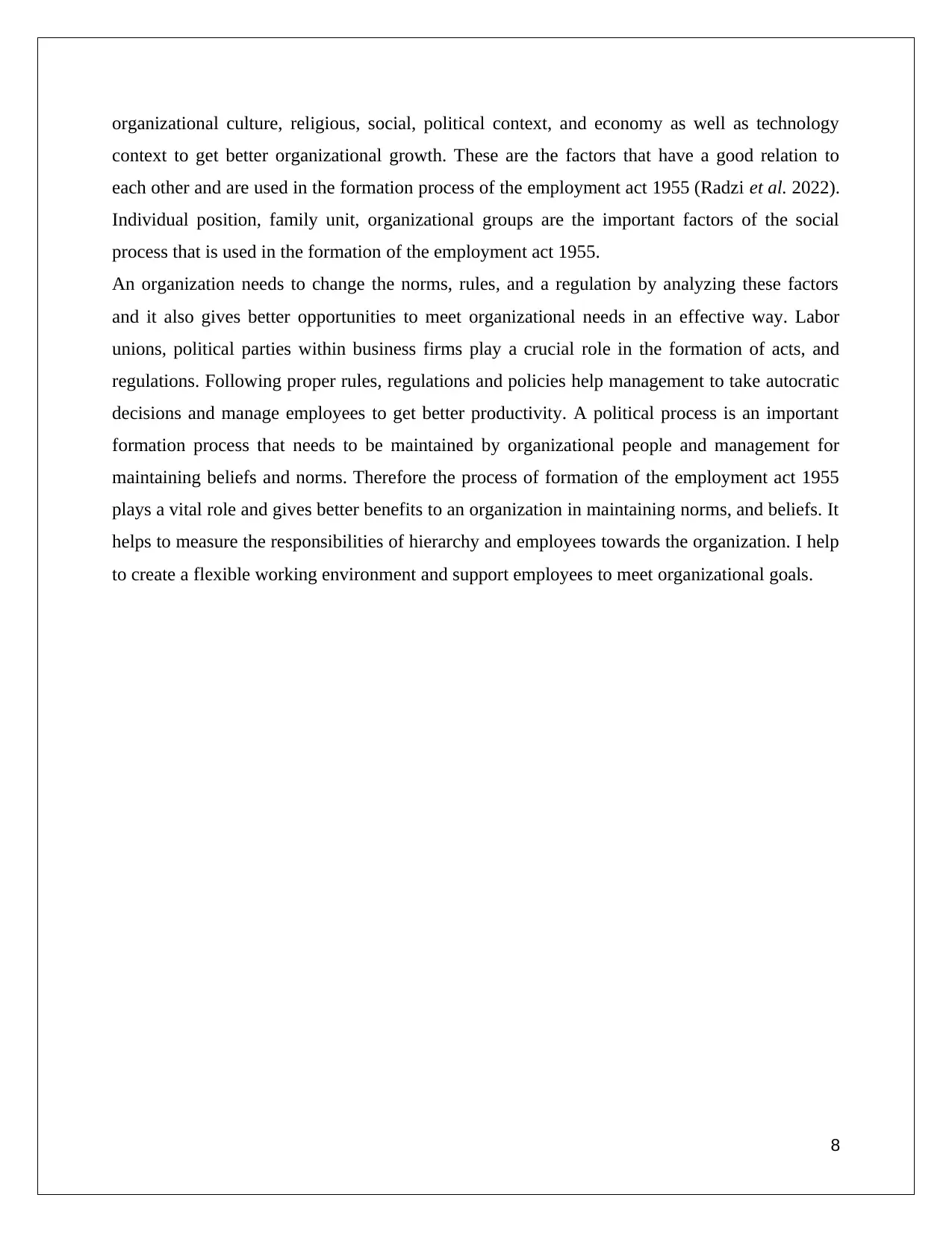
organizational culture, religious, social, political context, and economy as well as technology
context to get better organizational growth. These are the factors that have a good relation to
each other and are used in the formation process of the employment act 1955 (Radzi et al. 2022).
Individual position, family unit, organizational groups are the important factors of the social
process that is used in the formation of the employment act 1955.
An organization needs to change the norms, rules, and a regulation by analyzing these factors
and it also gives better opportunities to meet organizational needs in an effective way. Labor
unions, political parties within business firms play a crucial role in the formation of acts, and
regulations. Following proper rules, regulations and policies help management to take autocratic
decisions and manage employees to get better productivity. A political process is an important
formation process that needs to be maintained by organizational people and management for
maintaining beliefs and norms. Therefore the process of formation of the employment act 1955
plays a vital role and gives better benefits to an organization in maintaining norms, and beliefs. It
helps to measure the responsibilities of hierarchy and employees towards the organization. I help
to create a flexible working environment and support employees to meet organizational goals.
8
context to get better organizational growth. These are the factors that have a good relation to
each other and are used in the formation process of the employment act 1955 (Radzi et al. 2022).
Individual position, family unit, organizational groups are the important factors of the social
process that is used in the formation of the employment act 1955.
An organization needs to change the norms, rules, and a regulation by analyzing these factors
and it also gives better opportunities to meet organizational needs in an effective way. Labor
unions, political parties within business firms play a crucial role in the formation of acts, and
regulations. Following proper rules, regulations and policies help management to take autocratic
decisions and manage employees to get better productivity. A political process is an important
formation process that needs to be maintained by organizational people and management for
maintaining beliefs and norms. Therefore the process of formation of the employment act 1955
plays a vital role and gives better benefits to an organization in maintaining norms, and beliefs. It
helps to measure the responsibilities of hierarchy and employees towards the organization. I help
to create a flexible working environment and support employees to meet organizational goals.
8
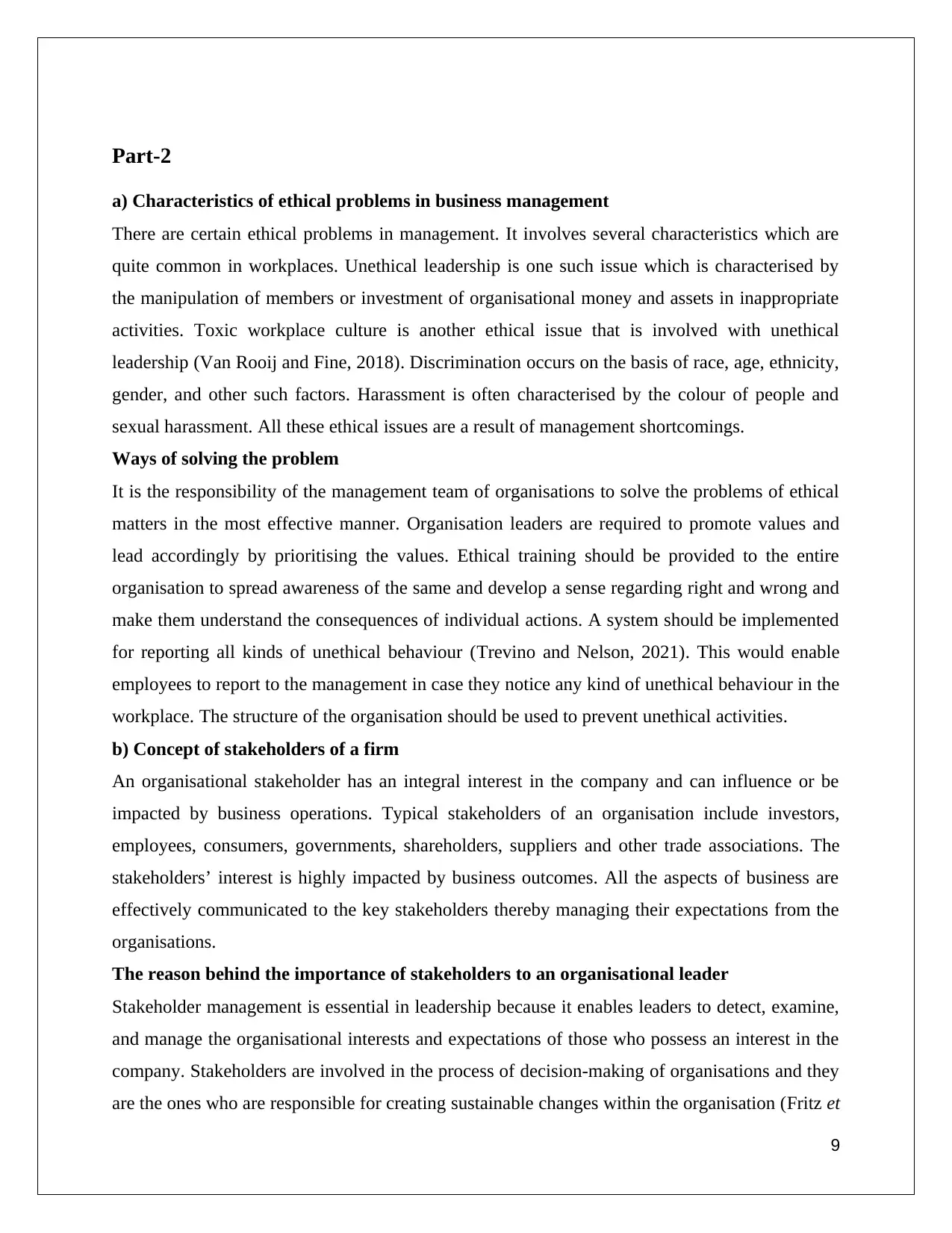
Part-2
a) Characteristics of ethical problems in business management
There are certain ethical problems in management. It involves several characteristics which are
quite common in workplaces. Unethical leadership is one such issue which is characterised by
the manipulation of members or investment of organisational money and assets in inappropriate
activities. Toxic workplace culture is another ethical issue that is involved with unethical
leadership (Van Rooij and Fine, 2018). Discrimination occurs on the basis of race, age, ethnicity,
gender, and other such factors. Harassment is often characterised by the colour of people and
sexual harassment. All these ethical issues are a result of management shortcomings.
Ways of solving the problem
It is the responsibility of the management team of organisations to solve the problems of ethical
matters in the most effective manner. Organisation leaders are required to promote values and
lead accordingly by prioritising the values. Ethical training should be provided to the entire
organisation to spread awareness of the same and develop a sense regarding right and wrong and
make them understand the consequences of individual actions. A system should be implemented
for reporting all kinds of unethical behaviour (Trevino and Nelson, 2021). This would enable
employees to report to the management in case they notice any kind of unethical behaviour in the
workplace. The structure of the organisation should be used to prevent unethical activities.
b) Concept of stakeholders of a firm
An organisational stakeholder has an integral interest in the company and can influence or be
impacted by business operations. Typical stakeholders of an organisation include investors,
employees, consumers, governments, shareholders, suppliers and other trade associations. The
stakeholders’ interest is highly impacted by business outcomes. All the aspects of business are
effectively communicated to the key stakeholders thereby managing their expectations from the
organisations.
The reason behind the importance of stakeholders to an organisational leader
Stakeholder management is essential in leadership because it enables leaders to detect, examine,
and manage the organisational interests and expectations of those who possess an interest in the
company. Stakeholders are involved in the process of decision-making of organisations and they
are the ones who are responsible for creating sustainable changes within the organisation (Fritz et
9
a) Characteristics of ethical problems in business management
There are certain ethical problems in management. It involves several characteristics which are
quite common in workplaces. Unethical leadership is one such issue which is characterised by
the manipulation of members or investment of organisational money and assets in inappropriate
activities. Toxic workplace culture is another ethical issue that is involved with unethical
leadership (Van Rooij and Fine, 2018). Discrimination occurs on the basis of race, age, ethnicity,
gender, and other such factors. Harassment is often characterised by the colour of people and
sexual harassment. All these ethical issues are a result of management shortcomings.
Ways of solving the problem
It is the responsibility of the management team of organisations to solve the problems of ethical
matters in the most effective manner. Organisation leaders are required to promote values and
lead accordingly by prioritising the values. Ethical training should be provided to the entire
organisation to spread awareness of the same and develop a sense regarding right and wrong and
make them understand the consequences of individual actions. A system should be implemented
for reporting all kinds of unethical behaviour (Trevino and Nelson, 2021). This would enable
employees to report to the management in case they notice any kind of unethical behaviour in the
workplace. The structure of the organisation should be used to prevent unethical activities.
b) Concept of stakeholders of a firm
An organisational stakeholder has an integral interest in the company and can influence or be
impacted by business operations. Typical stakeholders of an organisation include investors,
employees, consumers, governments, shareholders, suppliers and other trade associations. The
stakeholders’ interest is highly impacted by business outcomes. All the aspects of business are
effectively communicated to the key stakeholders thereby managing their expectations from the
organisations.
The reason behind the importance of stakeholders to an organisational leader
Stakeholder management is essential in leadership because it enables leaders to detect, examine,
and manage the organisational interests and expectations of those who possess an interest in the
company. Stakeholders are involved in the process of decision-making of organisations and they
are the ones who are responsible for creating sustainable changes within the organisation (Fritz et
9
⊘ This is a preview!⊘
Do you want full access?
Subscribe today to unlock all pages.

Trusted by 1+ million students worldwide
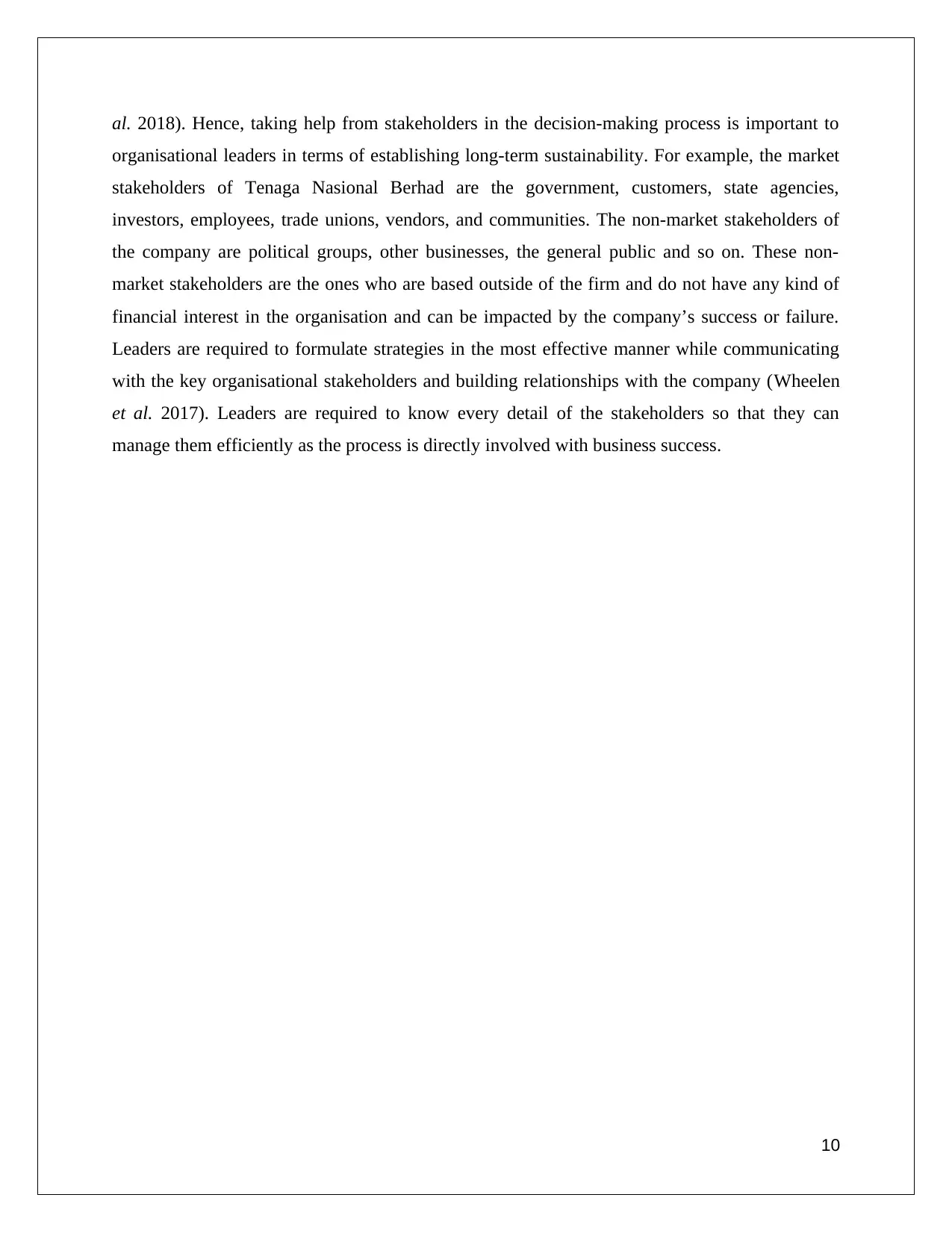
al. 2018). Hence, taking help from stakeholders in the decision-making process is important to
organisational leaders in terms of establishing long-term sustainability. For example, the market
stakeholders of Tenaga Nasional Berhad are the government, customers, state agencies,
investors, employees, trade unions, vendors, and communities. The non-market stakeholders of
the company are political groups, other businesses, the general public and so on. These non-
market stakeholders are the ones who are based outside of the firm and do not have any kind of
financial interest in the organisation and can be impacted by the company’s success or failure.
Leaders are required to formulate strategies in the most effective manner while communicating
with the key organisational stakeholders and building relationships with the company (Wheelen
et al. 2017). Leaders are required to know every detail of the stakeholders so that they can
manage them efficiently as the process is directly involved with business success.
10
organisational leaders in terms of establishing long-term sustainability. For example, the market
stakeholders of Tenaga Nasional Berhad are the government, customers, state agencies,
investors, employees, trade unions, vendors, and communities. The non-market stakeholders of
the company are political groups, other businesses, the general public and so on. These non-
market stakeholders are the ones who are based outside of the firm and do not have any kind of
financial interest in the organisation and can be impacted by the company’s success or failure.
Leaders are required to formulate strategies in the most effective manner while communicating
with the key organisational stakeholders and building relationships with the company (Wheelen
et al. 2017). Leaders are required to know every detail of the stakeholders so that they can
manage them efficiently as the process is directly involved with business success.
10
Paraphrase This Document
Need a fresh take? Get an instant paraphrase of this document with our AI Paraphraser
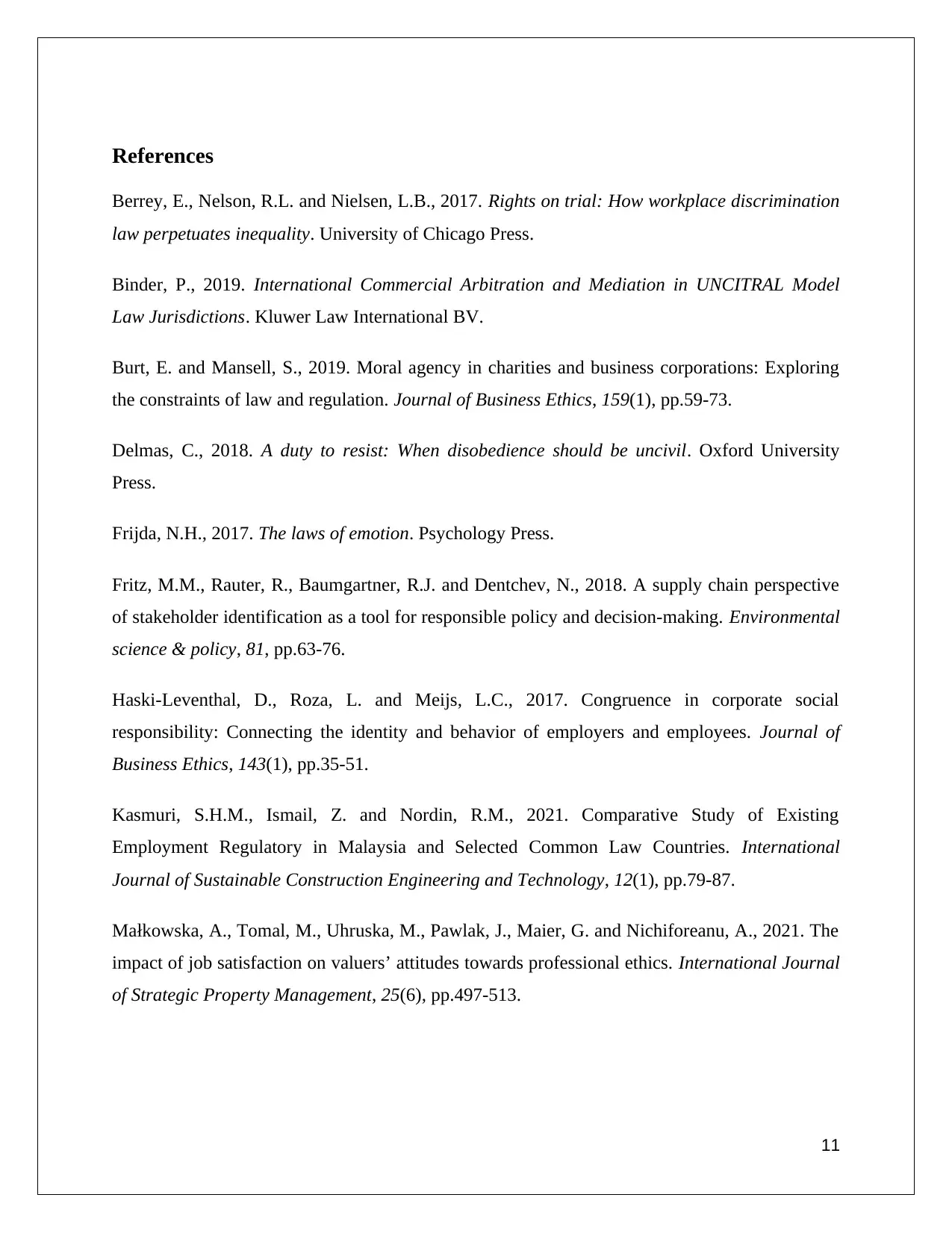
References
Berrey, E., Nelson, R.L. and Nielsen, L.B., 2017. Rights on trial: How workplace discrimination
law perpetuates inequality. University of Chicago Press.
Binder, P., 2019. International Commercial Arbitration and Mediation in UNCITRAL Model
Law Jurisdictions. Kluwer Law International BV.
Burt, E. and Mansell, S., 2019. Moral agency in charities and business corporations: Exploring
the constraints of law and regulation. Journal of Business Ethics, 159(1), pp.59-73.
Delmas, C., 2018. A duty to resist: When disobedience should be uncivil. Oxford University
Press.
Frijda, N.H., 2017. The laws of emotion. Psychology Press.
Fritz, M.M., Rauter, R., Baumgartner, R.J. and Dentchev, N., 2018. A supply chain perspective
of stakeholder identification as a tool for responsible policy and decision-making. Environmental
science & policy, 81, pp.63-76.
Haski-Leventhal, D., Roza, L. and Meijs, L.C., 2017. Congruence in corporate social
responsibility: Connecting the identity and behavior of employers and employees. Journal of
Business Ethics, 143(1), pp.35-51.
Kasmuri, S.H.M., Ismail, Z. and Nordin, R.M., 2021. Comparative Study of Existing
Employment Regulatory in Malaysia and Selected Common Law Countries. International
Journal of Sustainable Construction Engineering and Technology, 12(1), pp.79-87.
Małkowska, A., Tomal, M., Uhruska, M., Pawlak, J., Maier, G. and Nichiforeanu, A., 2021. The
impact of job satisfaction on valuers’ attitudes towards professional ethics. International Journal
of Strategic Property Management, 25(6), pp.497-513.
11
Berrey, E., Nelson, R.L. and Nielsen, L.B., 2017. Rights on trial: How workplace discrimination
law perpetuates inequality. University of Chicago Press.
Binder, P., 2019. International Commercial Arbitration and Mediation in UNCITRAL Model
Law Jurisdictions. Kluwer Law International BV.
Burt, E. and Mansell, S., 2019. Moral agency in charities and business corporations: Exploring
the constraints of law and regulation. Journal of Business Ethics, 159(1), pp.59-73.
Delmas, C., 2018. A duty to resist: When disobedience should be uncivil. Oxford University
Press.
Frijda, N.H., 2017. The laws of emotion. Psychology Press.
Fritz, M.M., Rauter, R., Baumgartner, R.J. and Dentchev, N., 2018. A supply chain perspective
of stakeholder identification as a tool for responsible policy and decision-making. Environmental
science & policy, 81, pp.63-76.
Haski-Leventhal, D., Roza, L. and Meijs, L.C., 2017. Congruence in corporate social
responsibility: Connecting the identity and behavior of employers and employees. Journal of
Business Ethics, 143(1), pp.35-51.
Kasmuri, S.H.M., Ismail, Z. and Nordin, R.M., 2021. Comparative Study of Existing
Employment Regulatory in Malaysia and Selected Common Law Countries. International
Journal of Sustainable Construction Engineering and Technology, 12(1), pp.79-87.
Małkowska, A., Tomal, M., Uhruska, M., Pawlak, J., Maier, G. and Nichiforeanu, A., 2021. The
impact of job satisfaction on valuers’ attitudes towards professional ethics. International Journal
of Strategic Property Management, 25(6), pp.497-513.
11
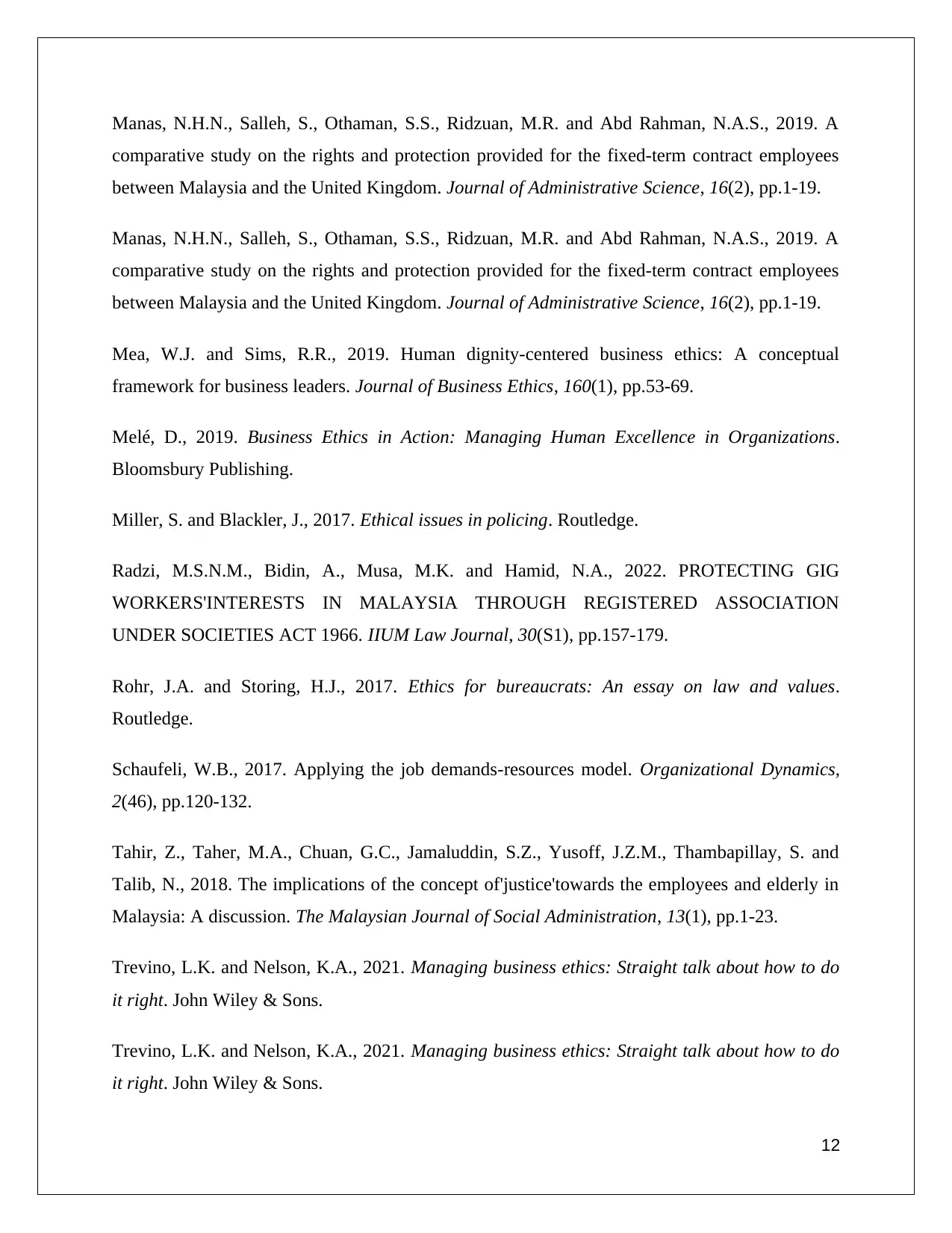
Manas, N.H.N., Salleh, S., Othaman, S.S., Ridzuan, M.R. and Abd Rahman, N.A.S., 2019. A
comparative study on the rights and protection provided for the fixed-term contract employees
between Malaysia and the United Kingdom. Journal of Administrative Science, 16(2), pp.1-19.
Manas, N.H.N., Salleh, S., Othaman, S.S., Ridzuan, M.R. and Abd Rahman, N.A.S., 2019. A
comparative study on the rights and protection provided for the fixed-term contract employees
between Malaysia and the United Kingdom. Journal of Administrative Science, 16(2), pp.1-19.
Mea, W.J. and Sims, R.R., 2019. Human dignity-centered business ethics: A conceptual
framework for business leaders. Journal of Business Ethics, 160(1), pp.53-69.
Melé, D., 2019. Business Ethics in Action: Managing Human Excellence in Organizations.
Bloomsbury Publishing.
Miller, S. and Blackler, J., 2017. Ethical issues in policing. Routledge.
Radzi, M.S.N.M., Bidin, A., Musa, M.K. and Hamid, N.A., 2022. PROTECTING GIG
WORKERS'INTERESTS IN MALAYSIA THROUGH REGISTERED ASSOCIATION
UNDER SOCIETIES ACT 1966. IIUM Law Journal, 30(S1), pp.157-179.
Rohr, J.A. and Storing, H.J., 2017. Ethics for bureaucrats: An essay on law and values.
Routledge.
Schaufeli, W.B., 2017. Applying the job demands-resources model. Organizational Dynamics,
2(46), pp.120-132.
Tahir, Z., Taher, M.A., Chuan, G.C., Jamaluddin, S.Z., Yusoff, J.Z.M., Thambapillay, S. and
Talib, N., 2018. The implications of the concept of'justice'towards the employees and elderly in
Malaysia: A discussion. The Malaysian Journal of Social Administration, 13(1), pp.1-23.
Trevino, L.K. and Nelson, K.A., 2021. Managing business ethics: Straight talk about how to do
it right. John Wiley & Sons.
Trevino, L.K. and Nelson, K.A., 2021. Managing business ethics: Straight talk about how to do
it right. John Wiley & Sons.
12
comparative study on the rights and protection provided for the fixed-term contract employees
between Malaysia and the United Kingdom. Journal of Administrative Science, 16(2), pp.1-19.
Manas, N.H.N., Salleh, S., Othaman, S.S., Ridzuan, M.R. and Abd Rahman, N.A.S., 2019. A
comparative study on the rights and protection provided for the fixed-term contract employees
between Malaysia and the United Kingdom. Journal of Administrative Science, 16(2), pp.1-19.
Mea, W.J. and Sims, R.R., 2019. Human dignity-centered business ethics: A conceptual
framework for business leaders. Journal of Business Ethics, 160(1), pp.53-69.
Melé, D., 2019. Business Ethics in Action: Managing Human Excellence in Organizations.
Bloomsbury Publishing.
Miller, S. and Blackler, J., 2017. Ethical issues in policing. Routledge.
Radzi, M.S.N.M., Bidin, A., Musa, M.K. and Hamid, N.A., 2022. PROTECTING GIG
WORKERS'INTERESTS IN MALAYSIA THROUGH REGISTERED ASSOCIATION
UNDER SOCIETIES ACT 1966. IIUM Law Journal, 30(S1), pp.157-179.
Rohr, J.A. and Storing, H.J., 2017. Ethics for bureaucrats: An essay on law and values.
Routledge.
Schaufeli, W.B., 2017. Applying the job demands-resources model. Organizational Dynamics,
2(46), pp.120-132.
Tahir, Z., Taher, M.A., Chuan, G.C., Jamaluddin, S.Z., Yusoff, J.Z.M., Thambapillay, S. and
Talib, N., 2018. The implications of the concept of'justice'towards the employees and elderly in
Malaysia: A discussion. The Malaysian Journal of Social Administration, 13(1), pp.1-23.
Trevino, L.K. and Nelson, K.A., 2021. Managing business ethics: Straight talk about how to do
it right. John Wiley & Sons.
Trevino, L.K. and Nelson, K.A., 2021. Managing business ethics: Straight talk about how to do
it right. John Wiley & Sons.
12
⊘ This is a preview!⊘
Do you want full access?
Subscribe today to unlock all pages.

Trusted by 1+ million students worldwide
1 out of 13
Related Documents
Your All-in-One AI-Powered Toolkit for Academic Success.
+13062052269
info@desklib.com
Available 24*7 on WhatsApp / Email
![[object Object]](/_next/static/media/star-bottom.7253800d.svg)
Unlock your academic potential
Copyright © 2020–2025 A2Z Services. All Rights Reserved. Developed and managed by ZUCOL.





